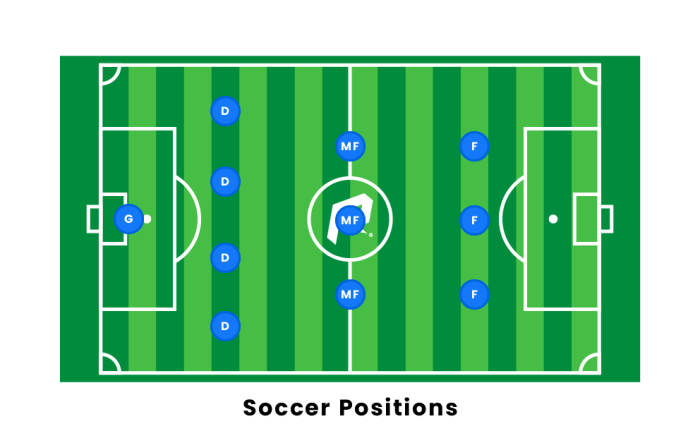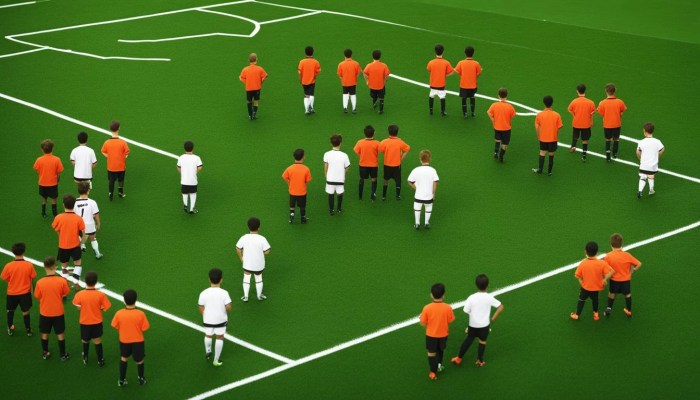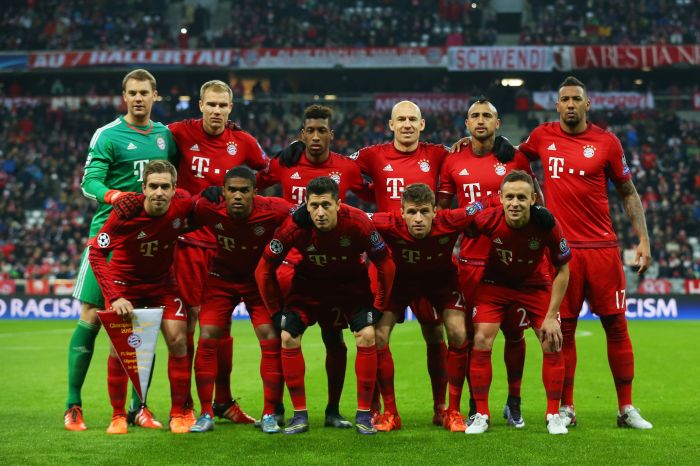Describe the makeup of a typical soccer team. – Soccer, a sport captivating billions globally, demands a team structure that fosters collaboration and expertise. Understanding the makeup of a typical soccer team is crucial for appreciating the intricacies and dynamics that drive success on the field.
This comprehensive guide delves into the essential components of a soccer team, exploring the roles, responsibilities, and attributes that contribute to its effectiveness.
1. Team Structure
A soccer team typically consists of 11 players on the field at any given time. These players are assigned to specific positions with varying responsibilities.
| Position | Responsibilities | Number of Players |
|---|---|---|
| Goalkeeper | Defends the goal from opposing shots | 1 |
| Defender | Protects the goal and prevents the opposing team from scoring | 4 |
| Midfielder | Controls the flow of the game and distributes the ball | 4 |
| Forward | Scores goals and creates scoring opportunities | 2 |
2. Roles and Responsibilities
Each position on the soccer field has specific roles and responsibilities. Goalkeepers are responsible for protecting the goal and preventing the opposing team from scoring. Defenders focus on protecting the goal and preventing the opposing team from creating scoring opportunities.
Midfielders control the flow of the game and distribute the ball, while forwards are responsible for scoring goals and creating scoring opportunities.
3. Team Dynamics

Team dynamics play a crucial role in soccer. Effective communication, leadership, and teamwork are essential for success. Players must be able to communicate effectively with each other to coordinate their movements and tactics. Leadership is also important, as players need to be able to rely on their leaders to make decisions and motivate the team.
Teamwork is essential for success, as players must be able to work together to achieve their goals.
For example, a team with strong communication will be able to coordinate their movements and tactics more effectively, which can lead to more scoring opportunities and fewer goals conceded. A team with strong leadership will be able to rely on their leaders to make decisions and motivate the team, which can lead to greater success in close games.
A team with strong teamwork will be able to work together to achieve their goals, which can lead to greater success in both the short and long term.
4. Physical and Mental Attributes: Describe The Makeup Of A Typical Soccer Team.
Successful soccer players require both physical and mental attributes. Physically, players need to be fit, agile, and have good endurance. They also need to be able to make quick decisions and have good hand-eye coordination. Mentally, players need to be focused, disciplined, and have a strong work ethic.
They also need to be able to handle pressure and make decisions under stress.
For example, a player with good endurance will be able to play at a high level for the entire game, which can give their team an advantage in close games. A player with good agility will be able to change direction quickly and easily, which can help them to create scoring opportunities and avoid defenders.
A player with good decision-making skills will be able to make the right decisions in the heat of the moment, which can lead to greater success for their team.
5. Training and Development

Soccer players typically undergo extensive training and development programs to improve their individual and team performance. These programs may include physical training, technical training, tactical training, and mental training. Physical training focuses on improving players’ fitness, strength, and endurance. Technical training focuses on improving players’ ball skills, passing, shooting, and dribbling.
Tactical training focuses on improving players’ understanding of the game and how to work together as a team. Mental training focuses on improving players’ focus, discipline, and work ethic.
For example, a player who undergoes physical training may be able to improve their endurance, which can give them an advantage in close games. A player who undergoes technical training may be able to improve their ball skills, which can help them to create scoring opportunities and avoid defenders.
A player who undergoes tactical training may be able to improve their understanding of the game, which can lead to greater success for their team.
6. Coaching and Management

Coaches and managers play a vital role in the success of a soccer team. Coaches are responsible for developing and implementing training programs, selecting players, and making tactical decisions during games. Managers are responsible for the overall operation of the team, including finances, travel, and public relations.
Effective coaches and managers have a number of qualities, including strong leadership skills, a deep understanding of the game, and the ability to motivate players. They are also able to make quick decisions under pressure and handle difficult situations.
For example, a coach with strong leadership skills will be able to motivate players and get them to perform at their best. A coach with a deep understanding of the game will be able to make tactical decisions that give their team an advantage.
A coach who is able to make quick decisions under pressure will be able to make the right decisions in the heat of the moment, which can lead to greater success for their team.
7. Team Culture and Values

Team culture and values play an important role in the success of a soccer team. Teams with a positive culture and strong values are more likely to be successful than teams with a negative culture and weak values. Positive team culture and values include respect, teamwork, and discipline.
Teams with a positive team culture are more likely to be successful because players are more likely to be motivated and work together to achieve their goals.
For example, a team with a strong team culture will be more likely to be successful because players are more likely to be motivated and work together to achieve their goals. A team with a positive team culture will be more likely to have a positive attitude, which can lead to greater success on the field.
A team with a strong team culture will be more likely to be able to overcome adversity, which can lead to greater success in the long term.
FAQ Section
What are the key positions in a soccer team?
Goalkeeper, defenders, midfielders, and forwards are the core positions in a soccer team, each with distinct responsibilities in attacking, defending, and controlling the ball.
How important is teamwork in soccer?
Teamwork is paramount in soccer, as players must communicate effectively, support each other on and off the field, and work together to achieve a common goal.
What physical attributes are essential for soccer players?
Soccer players require a combination of strength, speed, agility, endurance, and flexibility to perform at their best.